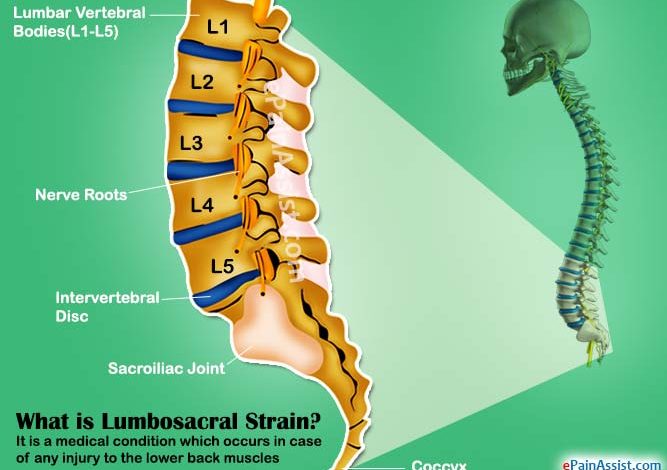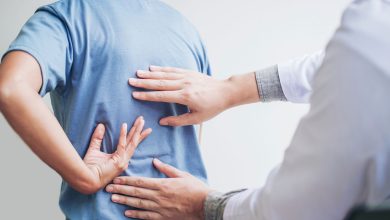What are the long-term side-effects of a Lumbosacral Strain?

It may feel sore, tight, or achy in your muscles. However, a Lumbosacral strain typically worsens with specific movements that activate the affected muscles.
Doctors may recommend a day or two of rest, cold/heat therapy, and medications to treat a Lumbosacral strain. However, most cases of lumbar strain will be resolved in two to three weeks. As long as you take proper precautions and do not aggravate the injury, strained muscles and ligaments will generally heal on their own without extensive medical intervention.
What is a strain?
A strain is an injury to either a muscle or tendon. Tendons are the tough, fibrous bands of tissue that connect muscle to bone. With a back strain, the muscles and tendons that support the spine are twisted, pulled, or torn.
What are the signs of lumbosacral strain?
Symptoms may include:
- Pain in the back, often on one side
- Pain that gets worse with movement and gets better with rest
- Inability to move as freely as usual
- Swelling, slight redness, and skin warmth in the painful area
What causes lumbosacral strain?
Injury can damage the tendons and muscles in the lower back. Pushing and pulling sports, such as weight lifting or football, can lead to a lumbar strain.
How can we Cure a lumbosacral strain?
Treatment of a lumbosacral strain focuses on reducing pain and avoiding further injury. Bed rest is usually not recommended for low back pain. Treatments may include:
- Avoiding or changing the action that caused the problem. This helps prevent injuring the tissues again.
- Prescription or over-the-counter medicines. This helps in reducing inflammation, swelling, and pain. NSAIDs (nonsteroidal anti-inflammatory drugs) are the most common medicines used. Medicines may be prescribed or bought over the counter. They may be given as pills. Or they may put on the skin a gel, cream, or patch.
- Cold or heat packs. This helps in reducing pain and swelling.
- Stretching and other exercises. These improve flexibility and strength.
- Physical therapy. This usually includes exercises and other treatments.
- Injections of medicine. This may relieve symptoms. The medicine is usually a corticosteroid. This is strong anti-inflammatory medicine.
However, If these treatments don’t relieve symptoms, your healthcare provider may order imaging tests to learn more about the problem. Sometimes you may need surgery.
Surgery
The pain from sprains and strains can be so severe the patient may feel surgery is a certainty! Thankfully, most sprains and strains can be managed using the treatments listed above. Typically disorders that may warrant surgery include spinal cord impingement and structural deformity. Less than 5% of all back problems require surgery.
However, If surgery is recommended, always ask the purpose of the operation and what results you can expect. Never be afraid to obtain a second opinion.
What are the Long-term effects of lumbosacral strain?
As long as you take proper precautions and do not aggravate the injury, strained muscles and ligaments will generally heal on their own without extensive medical intervention.
However, Chiropractic treatment, acupuncture, and physical therapy may also help to alleviate symptoms and speed your recovery. The most common treatment is alternating hot and cold packs, over-the-counter pain and anti-inflammatory medication as well as a few days of rest.
It is usually best to try and return to normal activities within a few days of the injury. Being sedentary for a long period of time may cause weight gain and muscle atrophy that could make future lumbar injuries more severe.
Risk factors of a lumbosacral strain:
Greater than 90% of the population will experience at least one episode of back pain during their lifetime. Lumbar strain is the cause of low back pain in 70% of cases and is most common between age 20 and 50.
Is a lumbosacral strain a symptom of a Dead leg?
Common Risk factors of a lumbosacral strain include repetitive or heavy lifting, prolonged abnormal position of the trunk.
However, poor body mechanics or ergonomics, core weakness, and tight hip girdle musculature (e.g. hamstrings, hip flexors) are major risk factors of a lumbosacral strain causing a Dead leg (numbness in legs) or Sciatica (nerve pain in leg)sometimes.
How can we diagnose a lumbar strain?
In addition to a complete medical history and physical exam, diagnostic procedures for low back pain may include the following.
- X-ray. A diagnostic test that produces images of internal tissues, bones, and organs onto film.
- Computed tomography scan (also called a CT or CAT scan). This is an imaging test that uses X-rays and a computer to make detailed images of the body. A CT scan shows details of the bones, muscles, fat, and organs. A CT scan shows detailed images of bones, muscles, fat, and organs.
- Magnetic resonance imaging (MRI). A diagnostic procedure that uses a combination of large magnets, radio frequencies, and a computer to produce detailed images of organs and structures within the body.
- Electromyogram (EMG). A test to evaluate nerve and muscle function.
Lumbosacral Strain Prevention:
Common preventions of a Lumbosacral strain include:
- Proper posture lessens stress to the back.
- A healthy body needs regular exercise! Strong abdominal muscles help support the spine.
- Stop smoking! Nicotine restricts the blood flow needed to deliver oxygen and nourishment to the spine.
- Healthy eating habits help keep body weight moderate to reduce excessive stress to the spine.
However, Learn how to safely lift and carry items, apply ergonomic principles by selecting spine-friendly chairs, always wear a seat belt when traveling, and wear protective equipment during sports so the fun can be safe and injury-free.




